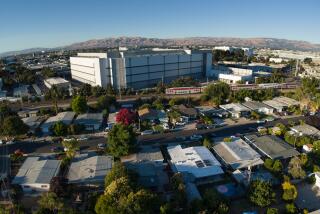Sacramento Throws in Kitchen Sink in Bid for Packard Bell Relocation : Relocation: The city is poised to offer the computer maker $26 million in loan incentives to move to an old Army base.
- Share via
SACRAMENTO — Packard Bell is on the verge of sewing up a deal to relocate to Sacramento that seems almost too good to be true: Above and beyond a $5-million tax break granted by the Legislature, the computer manufacturer is about to be offered a $26-million loan by the city.
City officials say they’ve never before handed a pot this sweet to a company--especially a marketing operation with little in the way of heavy capital assets to pledge as collateral--but they believe this case warrants the risk.
Sacramento is trying to woo one of the nation’s largest computer makers to the Sacramento Army Depot from Chatsworth, where the Jan. 17 earthquake jolted Packard Bell into the realization that it wanted to flee Southern California.
The City Council will vote today on the deal, which pushed Sacramento to the head of a list of places--including Utah and Oregon--that have been fighting to win Packard Bell as a corporate citizen.
For Sacramento, the deal means a gain not only of 3,000 jobs and an $80-million annual payroll, but--with the Army Depot due to close within three years--a chance to be in the forefront of the nationwide defense conversion movement. The offer is also one more illustration of the brutal competition among localities for jobs.
“What we really have done here is create a national model for base conversion,” Sacramento City Councilman Darrell Steinberg said. “In this day and age, this is the kind of aggressive work that cities have to do to maintain a viable tax base.”
Tell that to the city of Palmdale, which tried to catch Packard Bell’s eye but in the end couldn’t compete with the negotiations under way in Sacramento.
Assemblyman William J. (Pete) Knight (R-Palmdale), who helped spearhead attempts to lure Packard Bell to the Antelope Valley, said his coalition was prepared to offer a combined package of $40 million in incentives. But the firm wasn’t interested. Company officials said in a memo that Palmdale, perched on the San Andreas fault, posed an “unacceptable earthquake risk.”
To help cover Packard Bell’s moving expenses, Palmdale offered a reimbursement of $3 million three years after the costs were incurred. But Sacramento is poised to offer a $6-million to $9-million relocation loan up front.
Had Packard Bell decided to move to Palmdale, it would have had to build a new facility, though it would have gotten a deal on the land. The Sacramento proposal gives the firm a $17-million loan to upgrade existing depot buildings as it sees fit.
Sacramento city officials say that had they not found Packard Bell, they would have had to spend $19 million to renovate the depot’s 50-year-old structures. Looking at the numbers that way, the city figures it is only going out on a limb for $7 million of the proposed $26-million deal.
“People talk about the risks and the fact that the city is going to lend $26 million,” Steinberg said. “I turn the question around and say, what are the risks to the city and the community of not doing the deal with Packard Bell? What you would have left is a large military base.”
Under terms of the deal, Packard Bell would have five years to repay the relocation loan and 12 years to pay back the loan for improvements. After remaining on the base for 10 years, the company would have an option to purchase the 210 acres it will occupy for $6.8 million.
For the state’s part, Gov. Pete Wilson last week signed a bill by state Sen. Leroy Greene (D-Carmichael) that would give Packard Bell a $5-million tax break by creating an enterprise zone at the Sacramento Army Depot.
Packard Bell has hinted that it will accept Sacramento’s offer if one comes from the City Council, but the firm is carefully hedging its comments.
“The offer from Sacramento is a nice offer, and Packard Bell would be delighted to stay in California,” spokeswoman Liz O’Donnell said.
More to Read
Inside the business of entertainment
The Wide Shot brings you news, analysis and insights on everything from streaming wars to production — and what it all means for the future.
You may occasionally receive promotional content from the Los Angeles Times.










